英语语法之疑问句学生版本
小学英语语法课件-疑问句 (共29张PPT) 全国通用
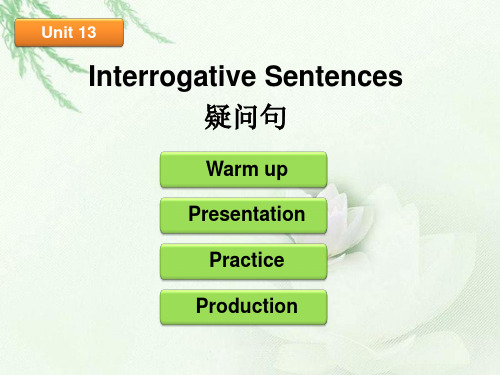
Presentation Grammar Box
Presentation Grammar Box
Presentation Grammar Box
Presentation Grammar Box
Presentation Grammar Box
Presentation Grammar Box
A. What
B. When
C. Where
D. Which
Production Quiz
Production Quiz
Practice Oral Practice
选择正确的答语。
A. By car. B. Yes, she has. C. Yes, I do. D. It’ s 10 dollars. E. He is my brother.
( E) 1. Who is he? ( A) 2. Do you go home by car or by subway?
Practice
Exercise 2
aren't you
Practice
Exercise 3
Practice
Exercise 4
5
PPrraaccttiicceeI Exercise 1
特殊疑问句 一般疑问句 一般疑问句 一般疑问句 反意疑问句
Practice
Exercise 2
aren't you didn’t she
My grandma has been to many places, _h_a_s_n_’_t _s_h_e_? Lily and Lucy will go to school next week, _w__o_n_’_t _th_e_y__?
小学英语语法之特殊疑问句资料讲解共31页
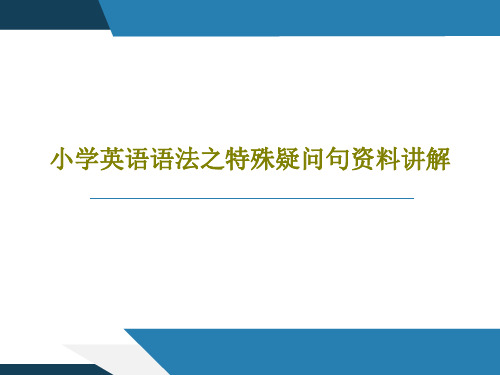
谢谢!
36、自己的鞋子,自己知道紧在哪弱。——拉罗什福科
xiexie! 38、我这个人走得很慢,但是我从不后退。——亚伯拉罕·林肯
39、勿问成功的秘诀为何,且尽全力做你应该做的事吧。——美华纳
40、学而不思则罔,思而不学则殆。——孔子
小学英语语法之特殊疑问句资料讲解
1、纪律是管理关系的形式。——阿法 纳西耶 夫 2、改革如果不讲纪律,就难以成功。
3、道德行为训练,不是通过语言影响 ,而是 让儿童 练习良 好道德 行为, 克服懒 惰、轻 率、不 守纪律 、颓废 等不良 行为。 4、学校没有纪律便如磨房里没有水。 ——夸 美纽斯
5、教导儿童服从真理、服从集体,养 成儿童 自觉的 纪律性 ,这是 儿童道 德教育 最重要 的部分 。—— 陈鹤琴
小学英语语法---一般疑问句和特殊疑问句ppt课件
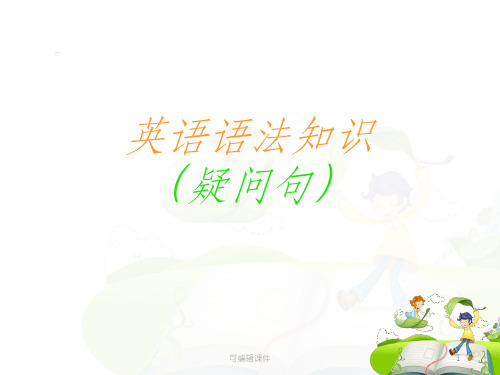
可编辑课件
4
e.g
This is Amy's bike.(一般疑问句)
Is this Amy's bike?
Yes, this is. (肯定回答)错误
No, this isn‘t. (否定回答)错误
Did you go to Beijing last weekend?
Yes, I did. (肯定回答)
2、如句子里是动词就在这些词前加 don't,doesn't,didn't
(1)主语是第一、二人称(复数)加don’t,第三人称单数加
doesn't
(2)如果是过去式就加didn't
例:I like dogs.
She likes swimming.
I don‘t like dogs.
She doesn’t like swimming.
No, I didn't. (否定回答)
I have some books. (一般疑问句)
Do you have any b可o编辑o课件ks?
5
变否定句的做法:
1、如句子里是be动词:am,is,are,was,were 就在这些词后加 not
例: He is Tom.
He is not Tom.
( B) 25. ______ tea did you have?
Two cups. • How many B. How much C. How soon D. Which
可编辑课件
15
感谢亲观看此幻灯片,此课件部分内容来源于网络, 如有侵权请及时联系我们删除,谢谢配合!
感 谢 阅
读感
谢
中考英语语法专题-特殊句型之疑问句

初中英语语法专题-特殊句型之疑问句疑问句按结构可分为四种:一般疑问句、特殊疑问句、选择疑问句、反意疑问句。
一、一般疑问句1、一般疑问句概述一般疑问句,也可称为是否型问句,因为它一般用yes或no回答的,基本的结构为:be/助动词/情态动词+主语+谓语/表语+(其他),句子要读升调。
对一般疑问句作肯定回答时,通常是Yes, 主语+be/助动词/情态动词;否定回答时,通常是No, 主语+be/助动词/情态动词+not,not通常用省略形式,如:---Can you swim to the other side?你能游到对岸吗?---Yes, I can. 是的,我能。
---No, I can’t. 不,我不能。
注意:回答一般疑问句除了用yes或no外,也可用certainly,probably,perhaps,of course,all right,with pleasure等代替yes,用never,not at all等代替no,使得语气更加客气,委婉,如:---Can you help me? 你能帮个忙吗?---Certainly. 当然。
---Could you please make less noise? 你可以小声一点吗?---All right, sir. 好的,先生。
---Have you been there? 你到过那里吗?---Never. 从来没有。
2. 一般疑问句的否定式一般疑问句的否定式,一般结构为:系动词/助动词/情态动词+not+主语,且一般用缩略形式,如:---Don’t you believe me? 你不相信我?(表惊讶)---Yes, I do. 不,我相信你。
---No, I don’t. 是的,我不信。
否定疑问句并不单纯表示提问,它常常带有感情色彩。
否定疑问句的完全式比简略式所表达的语气更强烈些。
否定的一般疑问句的答语中,yes的含义为“不”,no的含义为“是”,但在回答这类句子时,应该注意yes后接肯定结构,no后接否定结构,这和汉语习惯不同。
初中英语疑问句知识点
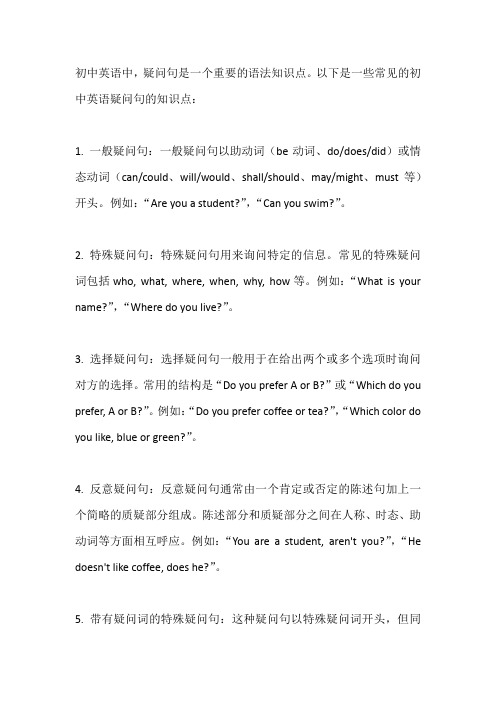
初中英语中,疑问句是一个重要的语法知识点。
以下是一些常见的初中英语疑问句的知识点:1. 一般疑问句:一般疑问句以助动词(be动词、do/does/did)或情态动词(can/could、will/would、shall/should、may/might、must等)开头。
例如:“Are you a student?”,“Can you swim?”。
2. 特殊疑问句:特殊疑问句用来询问特定的信息。
常见的特殊疑问词包括who, what, where, when, why, how等。
例如:“What is your name?”,“Where do you live?”。
3. 选择疑问句:选择疑问句一般用于在给出两个或多个选项时询问对方的选择。
常用的结构是“Do you prefer A or B?”或“Which do you prefer, A or B?”。
例如:“Do you prefer coffee or tea?”,“Which color do you like, blue or green?”。
4. 反意疑问句:反意疑问句通常由一个肯定或否定的陈述句加上一个简略的质疑部分组成。
陈述部分和质疑部分之间在人称、时态、助动词等方面相互呼应。
例如:“You are a student, aren't you?”,“He doesn't like coffee, does he?”。
5. 带有疑问词的特殊疑问句:这种疑问句以特殊疑问词开头,但同时也包含了一般疑问句的结构。
例如:“What time do you usually get up?”,“How often do you exercise?”。
学生在学习疑问句时需要注意以下几点:-疑问句的变换方式,如将陈述句转换为一般疑问句、特殊疑问句等;-特殊疑问词的使用及其不同的含义和用法;-语序的变化,特别是特殊疑问句中主语和谓语的位置变化。
小学英语语法详解疑问句--一般疑问句、特殊疑问句
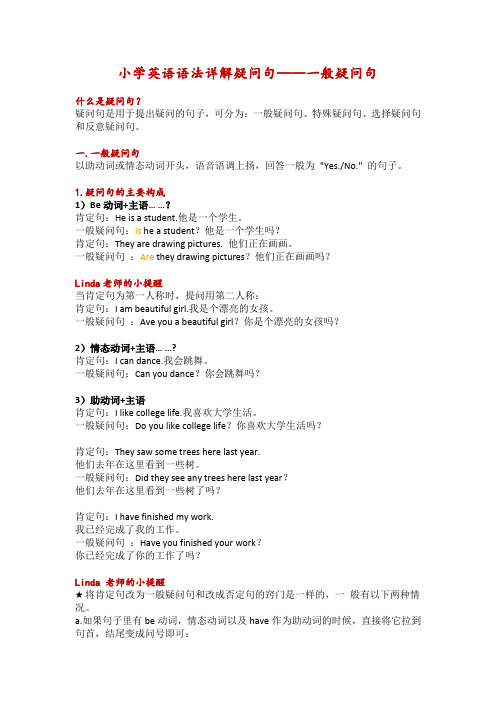
小学英语语法详解疑问句——一般疑问句什么是疑问句?疑问句是用于提出疑问的句子,可分为:一般疑问句、特殊疑问句、选择疑问句和反意疑问句。
一.一般疑问句以助动词或情态动词开头,语音语调上扬,回答一般为"Yes./No." 的句子。
1.疑问句的主要构成1)Be动词+主语… …?肯定句:He is a student.他是一个学生。
一般疑问句:Is he a student?他是一个学生吗?肯定句:They are drawing pictures. 他们正在画画。
一般疑问句:Are they drawing pictures?他们正在画画吗?Linda老师的小提醒当肯定句为第一人称时,提问用第二人称:肯定句:I am beautiful girl.我是个漂亮的女孩。
一般疑问句:Ave you a beautiful girl?你是个漂亮的女孩吗?2)情态动词+主语… …?肯定句:I can dance.我会跳舞。
一般疑问句:Can you dance?你会跳舞吗?3)助动词+主语肯定句:I like college life.我喜欢大学生活。
一般疑问句:Do you like college life?你喜欢大学生活吗?肯定句:They saw some trees here last year.他们去年在这里看到一些树。
一般疑问句:Did they see any trees here last year?他们去年在这里看到一些树了吗?肯定句:I have finished my work.我已经完成了我的工作。
一般疑问句:Have you finished your work?你已经完成了你的工作了吗?Linda 老师的小提醒★将肯定句改为一般疑问句和改成否定句的窍门是一样的,一般有以下两种情况。
a.如果句子里有be动词,情态动词以及have作为助动词的时候,直接将它拉到句首,结尾变成问号即可:He is twelve.→ Is he twelve?She can swim.→ Can she swim?I have got it.→ Have you got it?b.当句子里是实义动词时,我们也可以用一些小窍门:肯定句:I go to the park.我去公园。
初一英语语法小知识之特殊疑问句
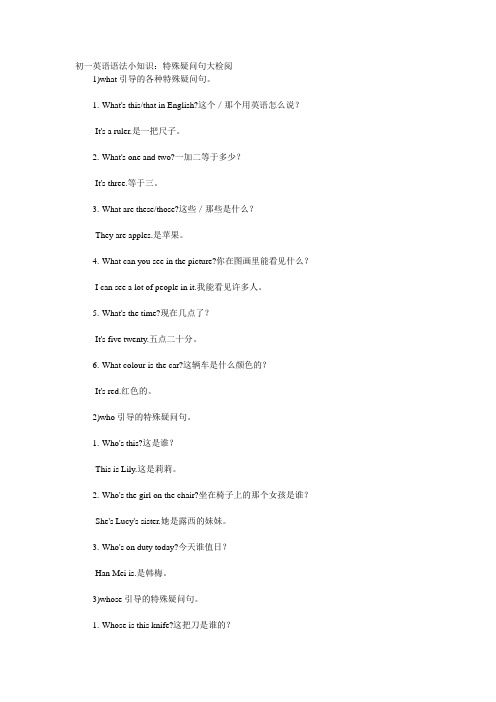
初一英语语法小知识:特殊疑问句大检阅1)what引导的各种特殊疑问句。
1.-What's this/that in English?这个/那个用英语怎么说?-It's a ruler.是一把尺子。
2.-What's one and two?一加二等于多少?-It's three.等于三。
3.-What are these/those?这些/那些是什么?-They are apples.是苹果。
4.-What can you see in the picture?你在图画里能看见什么?-I can see a lot of people in it.我能看见许多人。
5.-What's the time?现在几点了?-It's five twenty.五点二十分。
6.-What colour is the car?这辆车是什么颜色的?-It's red.红色的。
2)who引导的特殊疑问句。
1.-Who's this?这是谁?-This is Lily.这是莉莉。
2.-Who's the girl on the chair?坐在椅子上的那个女孩是谁?-She's Lucy's sister.她是露西的妹妹。
3.-Who's on duty today?今天谁值日?-Han Mei is.是韩梅。
3)whose引导的特殊疑问句。
1.-Whose is this knife?这把刀是谁的?-It's his.是他的。
2.-Whose coats are these?这是谁的上衣?-They are theirs.是他们的。
4)which引导的特殊疑问句。
1.-Which food do you like?你喜欢哪种食物?-I like eggs and meat.我喜欢蛋和肉。
2.-Which man?哪位男士?-The one in the white car.在白色小汽车里面的那一位。
小学英语语法详解疑问句--选择疑问句
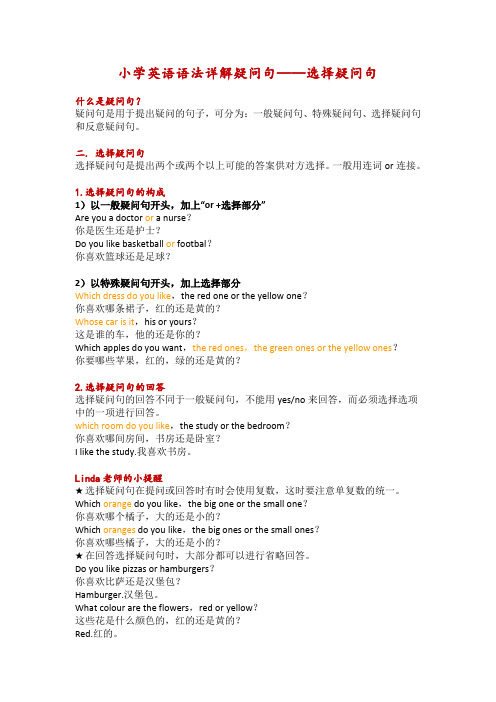
什么是疑问句?疑问句是用于提出疑问的句子,可分为:一般疑问句、特殊疑问句、选择疑问句和反意疑问句。
二. 选择疑问句选择疑问句是提出两个或两个以上可能的答案供对方选择。
一般用连词or连接。
1.选择疑问句的构成1)以一般疑问句开头,加上“or +选择部分”Are you a doctor or a nurse?你是医生还是护士?Do you like basketball or footbal?你喜欢篮球还是足球?2)以特殊疑问句开头,加上选择部分Which dress do you like,the red one or the yellow one?你喜欢哪条裙子,红的还是黄的?Whose car is it,his or yours?这是谁的车,他的还是你的?Which apples do you want,the red ones,the green ones or the yellow ones?你要哪些苹果,红的,绿的还是黄的?2.选择疑问句的回答选择疑问句的回答不同于一般疑问句,不能用yes/no来回答,而必须选择选项中的一项进行回答。
which room do you like,the study or the bedroom?你喜欢哪间房间,书房还是卧室?I like the study.我喜欢书房。
Linda老师的小提醒★选择疑问句在提问或回答时有时会使用复数,这时要注意单复数的统一。
Which orange do you like,the big one or the small one?你喜欢哪个橘子,大的还是小的?Which oranges do you like,the big ones or the small ones?你喜欢哪些橘子,大的还是小的?★在回答选择疑问句时,大部分都可以进行省略回答。
Do you like pizzas or hamburgers?你喜欢比萨还是汉堡包?Hamburger.汉堡包。
- 1、下载文档前请自行甄别文档内容的完整性,平台不提供额外的编辑、内容补充、找答案等附加服务。
- 2、"仅部分预览"的文档,不可在线预览部分如存在完整性等问题,可反馈申请退款(可完整预览的文档不适用该条件!)。
- 3、如文档侵犯您的权益,请联系客服反馈,我们会尽快为您处理(人工客服工作时间:9:00-18:30)。
英语语法之疑问句
一般疑问句是疑问句的一种。
它是指用yes(是)或no(否)来回答的句子。
其结构是:
系动词be/助动词/情态动词+主语+其他成分
通常回答为:
肯定:Yes,+主语+提问的助动词.
否定:No,+主语+提问的助动词+not.
如:
Are you from Japan﹖
Yes I am. / No I'm not.
Is her sister doing her homework now﹖
Yes she is. / No she isn't.
Does he work in a bank﹖
Yes he does. / No he doesn't.
Do you live near your school﹖
Yes I do. / No I don't.
Can you speak French﹖
Yes I can. / No I can't.
May I go home now﹖
Yes you may. / No you mustn't.
1.将陈述句变为一般疑问句时,如句中有be 动词(am/ is/ are)时,可直接将它们提至主语前。
如主语为第一人称,应将其改为第二人称。
如:I'm in Class 2Grade 1.→
Are you in Class 2Grade 1﹖
We're watching TV.→
Are you watching TV﹖
2.陈述句中有情态动词(can may must …)时,也可直接将它们提至主语前,即可成为一般疑问句。
如:
He can swim now.→
Can he swim now﹖
The children may come with us.→ May the children com e with us﹖
3.陈述句中只有一个实义动词作谓语且其时态为一般现在时,变为一般疑问句时要在句首加do或does 主语后的实义动词用原形。
如:
I like these animals.→
Do you like these animals﹖
She wants to go to the movies.→ Does she want to go to the movies﹖
4.一般疑问句一般读升调(↑)
5.一般疑问句有时不用yes或 no 回答。
如:
Are they in town now﹖
I think so.
May I sit here﹖
Certainly.
Does he like soccer﹖
Sorry I don't know.
6. 一般疑问句的第一单词总是虚词,读的时候要读轻声。
二、特殊疑问句
以疑问词开头,对句中某一成分提问的句子叫特殊疑问句。
常用的疑问词有:what(什么), who(谁), whose(谁的), which(哪个),when(何时), where(哪里), how(怎样), why(为何)等。
特殊疑问句有两种语序:
1.如疑问词作主语或主语的定语,即对主语或主语的定语提问,其语序是陈述句的语序:疑问词(+主语)+谓语动词+其他成分?如:who is singing in the room﹖
whose bike is broken﹖
2.如疑问词作其他成分,即对其他成分提问,其语序是:疑问词+一般疑问句语序?如:
what class are you in﹖
What does she look like﹖
Where are you from﹖
What time does he get up every morning﹖
How do you know﹖
注意:
1.回答特殊疑问句时,不能用yes / no,即问什么答什么,尤其是简略回答。
括号内是完整回答所需部分。
如:
Who is from Canada﹖
Helen (is from Canada).
Where's the restaurant﹖
(It is)Near the station.
Why do you like koalas﹖
(I like koalas)Because they are cute.
2.特殊疑问句的种类:
问人:who(谁) who is that girl?
问物主:whose(谁的) whose book is this?
问选择的事物:which(哪个) which pen do you like best, the red one or the blue one?
问无选择的事物:what(什么) What is your name?
问地点:where(哪里) Where are you from?
问原因:why (为什么) Why are you crying?
问方式:how(怎样) How do you come to school?
问一般时间:when(什么时候) When will you go to Beijing ?
问具体时间:What time is it?
问可数数量:How many days in a week?
问不可数数量: How much meat do you want? How much is it?
问距离:How far is the hospital?
问长度:How long is your ruler?
问颜色:what color is your pen?
英语语法之英语时态的用法
一般现在时
1) 经常性或习惯性的动作,常与表示频率的时间状语连用。
时间状语: every…, sometimes, at…, on Sunday
I leave home for school at 7 every morning.
2) 客观真理,客观存在,科学事实。
The earth moves around the sun.
Shanghai lies in the east of China.
3) 表示格言或警句中。
Pride goes before a fall. 骄者必败。
注意:此用法如果出现在宾语从句中,即使主句是过去时,从句谓语也要用一般现在时。
例:Columbus proved that the earth is round..
4) 现在时刻的状态、能力、性格、个性。
I don't want so much.
Ann Wang writes good English but does not speak well.
比较:Now I put the sugar in the cup.
I am doing my homework now.
第一句用一般现在时,用于操作演示或指导说明的示范性动作,表示言行的瞬间动作。
再如:Now watch me, I switch on the current and stand back. 第二句中的now是进行时的标志,表示正在进行的动作的客观状况,所以后句用一般现在时。
一般过去时
1)在确定的过去时间里所发生的动作或存在的状态。
时间状语有:yesterday, last week, an hour ago, the other day, in 1982等。
Where did you go just now?
2)表示在过去一段时间内,经常性或习惯性的动作。
When I was a child, I often played football in the street.
Whenever the Browns went during their visit, they were given a warm welcome.
将来时
1) will I will go to school tomorrow.
2) be going to +不定式,表示将来。
a. 主语的意图,即将做某事。
What are you going to do tomorrow?
b. 计划,安排要发生的事。
The play is going to be produced next month。
c. 有迹象要发生的事
Look at the dark clouds, there is going to be a storm.。
